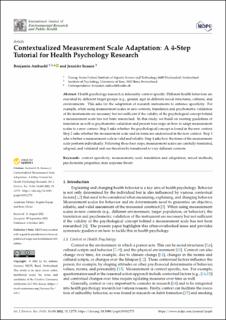Please use this identifier to cite or link to this item:
https://doi.org/10.21256/zhaw-28944| Publication type: | Article in scientific journal |
| Type of review: | Peer review (publication) |
| Title: | Contextualized measurement scale adaptation : a 4-step tutorial for health psychology research |
| Authors: | Ambühl, Benjamin Inauen, Jennifer |
| et. al: | No |
| DOI: | 10.3390/ijerph191912775 10.21256/zhaw-28944 |
| Published in: | International Journal of Environmental Research and Public Health |
| Volume(Issue): | 19 |
| Issue: | 19 |
| Page(s): | 12775 |
| Issue Date: | 6-Oct-2022 |
| Publisher / Ed. Institution: | MDPI |
| ISSN: | 1660-4601 1661-7827 |
| Language: | English |
| Subjects: | Context specificity; Item response theory; Measurement; Mixed methods; Scale translation and adaptation; Psychometric property |
| Subject (DDC): | 613: Personal health |
| Abstract: | Health psychology research is inherently context specific: Different health behaviors are executed by different target groups (e.g., gender, age) in different social structures, cultures, and environments. This asks for the adaptation of research instruments to enhance specificity. For example, when using measurement scales in new contexts, translation and psychometric validation of the instruments are necessary but not sufficient if the validity of the psychological concept behind a measurement scale has not been researched. In this study, we build on existing guidelines of translation as well as psychometric validation and present four steps on how to adapt measurement scales to a new context: Step 1 asks whether the psychological concept is found in the new context. Step 2 asks whether the measurement scale and its items are understood in the new context. Step 3 asks whether a measurement scale is valid and reliable. Step 4 asks how the items of the measurement scale perform individually. Following these four steps, measurement scales are carefully translated, adapted, and validated and can therefore be transferred to very different contexts. |
| URI: | https://digitalcollection.zhaw.ch/handle/11475/28944 |
| Fulltext version: | Published version |
| License (according to publishing contract): | CC BY 4.0: Attribution 4.0 International |
| Departement: | School of Management and Law |
| Organisational Unit: | Institute of Business Information Technology (IWI) |
| Appears in collections: | Publikationen School of Management and Law |
Files in This Item:
| File | Description | Size | Format | |
|---|---|---|---|---|
| 2022_Ambuehl-Inauen_Contextualized-measurement-scale-adaptation.pdf | 1.19 MB | Adobe PDF |  View/Open |
Show full item record
Ambühl, B., & Inauen, J. (2022). Contextualized measurement scale adaptation : a 4-step tutorial for health psychology research. International Journal of Environmental Research and Public Health, 19(19), 12775. https://doi.org/10.3390/ijerph191912775
Ambühl, B. and Inauen, J. (2022) ‘Contextualized measurement scale adaptation : a 4-step tutorial for health psychology research’, International Journal of Environmental Research and Public Health, 19(19), p. 12775. Available at: https://doi.org/10.3390/ijerph191912775.
B. Ambühl and J. Inauen, “Contextualized measurement scale adaptation : a 4-step tutorial for health psychology research,” International Journal of Environmental Research and Public Health, vol. 19, no. 19, p. 12775, Oct. 2022, doi: 10.3390/ijerph191912775.
AMBÜHL, Benjamin und Jennifer INAUEN, 2022. Contextualized measurement scale adaptation : a 4-step tutorial for health psychology research. International Journal of Environmental Research and Public Health. 6 Oktober 2022. Bd. 19, Nr. 19, S. 12775. DOI 10.3390/ijerph191912775
Ambühl, Benjamin, and Jennifer Inauen. 2022. “Contextualized Measurement Scale Adaptation : A 4-Step Tutorial for Health Psychology Research.” International Journal of Environmental Research and Public Health 19 (19): 12775. https://doi.org/10.3390/ijerph191912775.
Ambühl, Benjamin, and Jennifer Inauen. “Contextualized Measurement Scale Adaptation : A 4-Step Tutorial for Health Psychology Research.” International Journal of Environmental Research and Public Health, vol. 19, no. 19, Oct. 2022, p. 12775, https://doi.org/10.3390/ijerph191912775.
Items in DSpace are protected by copyright, with all rights reserved, unless otherwise indicated.